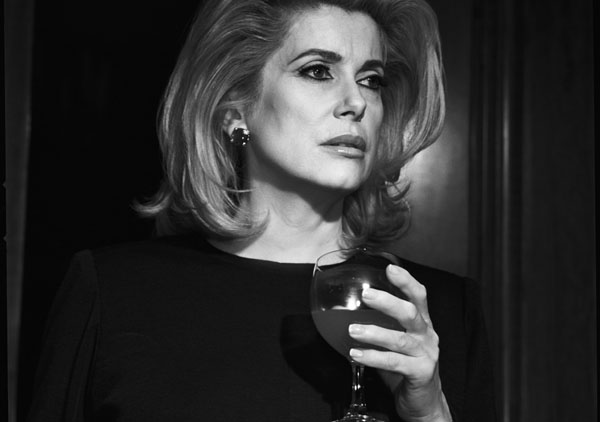At Cannes in 2007, Ali Naderzad managed to get a few words with Catherine Deneuve and spent a few of them on that most obvious of questions, “Of all the films you have done, which one remains your favorite?” The answer could hardly have been a surprise: “I still say it was The Umbrellas of Cherbourg.” As it happens, a new restoration of that 1964 musical is currently screening at New York’s Film Forum, part of a tribute to Jacques Demy; and today, on Deneuve’s 70th birthday, one might watch the film many consider her breakthrough to international stardom as a tribute to her as well.
Hard to mention Cherbourg without segueing straight into Demy’s The Young Girls of Rochefort (1967), starring Deneuve and her sister, Françoise Dorléac, who died in a horrible car accident in June 1967. She was only 25. An intensely private person, Deneuve—all the great films with all the great directors aside, even—has led a life gossip columnists, particularly in Europe, have found impossible to leave alone. She bore a son, Christian, with Roger Vadim; married photographer David Bailey when London was at its swingingest; starred in five films with Marcello Mastroianni, with whom she had a daughter, Chiara; was, for a while, romantically linked, as they say, with Clint Eastwood and François Truffaut. And so on. Activist for a slew of charities, a model and muse to designers, the face of Chanel No. 5, and then L’Oréal… but enough. The films.
“There was something about the sexually agape, porcelainized tabula rasa of Catherine Deneuve in her stardom’s infancy that fed the dream lives of filmmakers fat with rose-petal mousse,” wrote Michael Atkinson in the Voice in 2006. “Bloated and reeling, Roger Vadim saw Sadean excess and Jacques Demy saw pastel lollipops, while Luis Buñuel and Roman Polanski both saw behind their star’s dewy placidness an overgrown wilderness of pathology. Deneuve could never not be objectified—she is one of modern movies’ golden goats—and in a sense both Belle de Jour (1967) and Repulsion (1965) are tongue-in-cheek efforts to split the idol and see what bloodiness glistens inside. Of course, what we found were our own desires, yanked out like entrails, hoisted on flagstaffs, and exposed to mockery and gunshot.”
In 2009, Philip French wrote in the Observer that “her screen persona as ‘the ice maiden'” …
reached a peak as the seductive destroyer in her second Buñuel film Tristana (1970). The acerbic American critic Manny Farber called her “Catherine Deadnerve,” and Pauline Kael said, “Deneuve, with her icy yet mysterious perfection, is the French Grace Kelly.”
For the next 40 years she became the most famous figure of her generation. She worked steadily, appearing with the major actors of the day, Marcello Mastroianni, Omar Sharif, Michel Piccoli, Alain Delon, Yves Montand, Daniel Auteuil, Jack Lemmon, Burt Reynolds, Gérard Depardieu among them, often making several films a year. Playing a lesbian vampire opposite Susan Sarandon in The Hunger (1983) made her a cult figure with gay audiences. She appeared in two Truffaut films, the thriller Mississippi Mermaid (1969) and the story of theatre in wartime Paris, The Last Métro (1980), made big popular movies like the period drama Indochine (for which she was Oscar-nominated in 1993), and art-house pictures like Raul Ruiz‘s exquisite Proust adaptation, Le Temps retrouvé in the crucial role of Odette, one of the five pictures she made in 1999. She aged gracefully to take mature parts as mothers and grandmothers (in her [then] latest film, A Christmas Tale, her daughter Chiara Mastroianni plays her daughter-in-law). Perhaps the finest performance of her later career is as the alcoholic widow of a dodgy rich jeweler in Nicole Garcia’s thriller Place Vendôme (1998).
And so much left to mention. Her work with André Téchiné. Lars von Trier’s Dancer in the Dark (2000) and François Ozon’s 8 Women (2002). On December 7, Deneuve will be an honorary guest at the 26th European Film Awards Ceremony in Berlin, where she’ll receive a lifetime achievement award. And of course, she’s still working at her usual pace. Just one of three films in production at the moment, for example, is Benoît Jacquot‘s Trois coeurs; she’ll be appearing with her daughter again, Chiara Mastroianni, as well as Charlotte Gainsbourg.
If you’re feeling prompted to delve into Deneuve, the most delightful read I can recommend is Arnaud Desplechin‘s lengthy conversation with her that became the cover story of the November/December 2008 issue of Film Comment. Have fun.
For news and tips throughout the day every day, follow @KeyframeDaily on Twitter and/or the RSS feed. Get Keyframe Daily in your inbox by signing in at fandor.com/daily.




